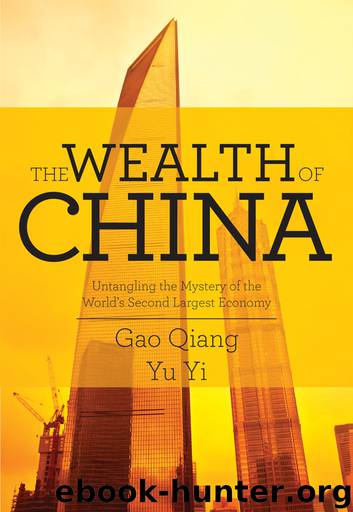The Wealth of China by Gao Qiang & Yu Yi

Author:Gao Qiang & Yu Yi
Language: eng
Format: epub
ISBN: 9781627740326
Publisher: CN Times Books Inc.
Published: 2014-03-19T15:25:03+00:00
NATURAL MONOPOLY IN A SPECIAL CONTEXT
The “special treatment” that state-owned enterprises enjoyed was also reflected in permitting and maintaining the existence of state-owned enterprises’ monopolistic advantages. The monopolistic advantages of state-owned enterprises were displayed in their dominance in some special domains: private enterprises lacked reasonable and legitimate entry channels, price controls existed in the market and interfered with the normal competition between private enterprises and state-owned enterprises, and so on.
In 2006, the State-owned Assets Supervision and Administration Commission (SASAC) director made clear that the seven major industries—defense, power generation and distribution, petroleum and petrochemicals, telecommunications, coal, civil aviation, and shipping—were absolutely controlled by state-owned enterprises. In the eighty industries of the society, seventy-two kinds allow state-owned capital to enter, sixty-two kinds allow foreign capital to enter, and only forty-one kinds allow private capital to enter.4
After the 2008 financial crisis, a new term appeared: renationalization. Renationalization refers to implementing certain market-oriented reforms in iron and steel, coal, and other industries, and also permitting a large amount of private capital to enter the above mentioned domains, thereby obtaining certain rights to current operations and development. However, under the policy’s guidance or coercion, private capital was once again excluded and marginalized by state-owned capital. In response to the 2008 financial crisis, the government’s ¥4 trillion investment plan (the plan to revitalize the top ten industries), and the orientation of the financial environment, all intentionally or unintentionally caused the phenomenon of renationalization to appear in some domains such as steel, iron, and coal.
For example, the “ten industrial restructuring and revitalization plan”—including automobile, steel, textile, equipment manufacturing, shipbuilding, telecommunications, light industry, petrochemicals, nonferrous metals, and logistics—exhibits the government’s shady support for state-owned enterprises. Some state-owned enterprises directly and proudly ascended onto the nation’s special protection list, as in the identification of China State Shipbuilding Corporation (CSSC) and China Shipbuilding Industry Corporation (CSIC) as the two leading companies focused on the development of the shipbuilding industry. Also, there were revitalization plans as well as emphasizing support of automotive industry bases: the bases of the big three car manufacturers—FAW Group Corporation, Dongfeng Motor Corporation and SAIC Motor Corporation, Ltd.—along with the three small-scale car manufacturers—Beijing Jeep, Tianjin Xiali, and Guangzhou Peugeot Automobile Company (GPAC). In addition, the planning of the steel industry also made clear “the promotion of transregional regrouping for Anben Steel Group Company, the Pangang Group, Dongbei Special Steel Group, Baosteel Group and Baogang Steel Group, and Ningbo Steel, etc., and the advancement of regional restructuring for Tianjin Pipe and Tiantie, Tianjin Steel, Tianjin Metallurgical Company, TISCO and iron and steel enterprises in the province, etc.”5
Price controls are also a tall glass door, weakening the competitiveness of private enterprises through administrative measures, and providing state-owned enterprises low-priced resources and policy protection. Take the “dual pricing system” launched in the 1980s as an example. This particular pricing mechanism caused private enterprises to be sidelined, and township enterprises also were not able to participate. Zhou Yaoting of the Wuxi Hongdou Group of Jiangsu township enterprises recalls it
Download
This site does not store any files on its server. We only index and link to content provided by other sites. Please contact the content providers to delete copyright contents if any and email us, we'll remove relevant links or contents immediately.
Pale Blue Dot by Carl Sagan(4996)
The Rules Do Not Apply by Ariel Levy(4956)
Goodbye Paradise(3798)
Ogilvy on Advertising by David Ogilvy(3601)
Liar's Poker by Michael Lewis(3441)
Delivering Happiness by Tony Hsieh(3418)
Into Thin Air by Jon Krakauer(3384)
Purple Cow by Seth Godin(3195)
Rogue Trader by Leeson Nick(3039)
The Social Psychology of Inequality by Unknown(3017)
The Airbnb Story by Leigh Gallagher(2850)
4 - Harry Potter and the Goblet of Fire by J.K. Rowling(2698)
The Mind Map Book by Tony Buzan(2570)
Bossypants by Tina Fey(2524)
Claridge's: The Cookbook by Nail Martyn & Erickson Meredith(2398)
All the President's Men by Carl Bernstein & Bob Woodward(2362)
Six Billion Shoppers by Porter Erisman(2296)
Master of the Game by Sidney Sheldon(2283)
Alibaba by Duncan Clark(2076)
